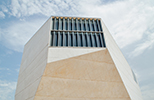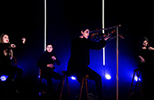 |
 |
|
Activities of the Composers Published by the MIC.PT
NOTA BENE: Due to the Covid-19 pandemic, the initiatives disseminated in the MIC.PT February Newsletter can be subject to changes in the programming or postponements. For updated information, please visit the websites of the organising entities. |

The premiere of the new chamber opera, O Homem dos Sonhos, with the music by António Chagas Rosa (composer published by the MIC.PT) and the libretto extracted from the homonymous story by Mário de Sá-Carneiro, will take place between February 4 & 6 at the São Luiz Theatre in Lisbon. O Homem dos Sonhos ( The Man of Dreams), a commission by the Ópera do Castelo Company, reflects on the human condition, on the tenuous thread separating insanity and sanity, the dream and reality, summing up the eternal human dissatisfaction and continuous obsession in transcending the limits of time, space and gender. This 7-scene opera tells the story of a misterious and elegant man who while dreaming travels to lands of new and indescribable colours, to cities where the gas that one breathes is composed of music, to lands with more than two sexes where not the body but the soul is visible... With music direction by Jan Wierzba, staging by Miguel Loureiro, and artistic direction by Catarina Molder, the opera will be performed by the MPMP Ensemble, the soprano Catarina Molder ( O Homem dos Sonhos) and the baritone Christian Luján ( Narrator). The opera will be also presented on February 11 at the Viriato Theatre in Viseu.
|
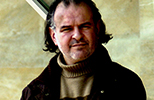
Premiered last year in December the new opera Mátria – aqui na terra, with the music by Fernando C. Lapa (composer published by the MIC.PT) and the libretto by Eduarda Freitas (based on the work by Miguel Torga), will be performed again in the second half of this month (February 20), this time at the Municipal Theatre in Bragança. Mátria – aqui na terra – the first original opera created in the Trás-os-Montes and Alto Douro regions –, “tells a story of a boy who lives in a Trás-os-Montes village and who's fascinated with enchanting stories, believing in a treasure hidden inside the mountain where he takes his sheep. The boy becomes a restless man, looking for peace outside. He comes across other lives, each of them with an anxiety of their own. And it's when the old age sticks to the bones, that the old man feels the urge to return, in search for the boy's certainties.” This project is musically directed by Jan Wierzba, staged by Ángel Fragua and performed by Job Tomé, Ana Santos, Mário João Alves, Tiago Matos, Paulo Lapa, Regina Freire, Madalena Tomé, Mátria Community Choir, Moços do Coro and the Mátria Orchestra (with members from the Banda Sinfónica Transmontana/ Douro Strings Academy).
|
This month Hugo Vasco Reis' music will be presented in Lisbon and in Tallinn (Estonia): his acousmatic work Polyphonic Mass (2021) will be performed on February 19 at the DME Immersive Festival (Lisboa Incomum); and the work Labyrinth of Stillness (2021) for harp, harpsichord and kannel, will be performed by the Una Corda Ensemble on February 20 at the Kadriorg Palace (Tallinn). Additionally, the new CD by this composer published by the MIC.PT, Voices and Landscapes, is now available on various digital platforms.
|
The work for saxophone and percussion Canção I – “I Ascolta” (2020) by João Quinteiro, composer published by the MIC.PT, will be performed by the Astrus Duo (Manuel Teles, saxophone; Paulo Amendoeira, percussion) at the Antena 2 Concert which will take place on February 8 at the MNAA – National Museum of Ancient Art in Lisbon. The programme of this recital will also include the music by Andrea Nicoli, Andrew Ford, Jexper Holmen, Giovanni Zaniol and Tõnu Kõrvits. The piece Canção I – “I Ascolta” is dedicated to the Astrus Duo.
|
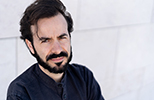 Three electroacoustic works by Jaime Reis (composer published by the MIC.PT) – Omniscience is a Collective · Part 1 (2009), Fluxus, pas trop haut dans le ciel (2016) and Magistri Mei: Bruckner (2020) –, are included in the programme of the DME Immersive Festival which will be taking place on February 19 and 20 at the Lisboa Incomum venue. “Regarding the sound and the music technologies in general, there are some elements that have fascinated me since I started composing. As I think about it, I recall the article by Max Mathews from 1963, often cited by John Chowning, where he states that there are no theoretical limits for the computer's performance as a source of musical sounds. Obviously, when I started composing, I knew nothing about Max Mathews, but I was interested in the idea of being able to expand my creativity. What fascinates me is not to know that I can do anything, but rather the idea that I still don’t know what I will be able to do. My work with the electronics has favoured this idea. In this sense I hope I will always be able to ‘change’ and ‘renew myself’” – said Jaime Reis in the MIC.PT Interview from October 2016.
|
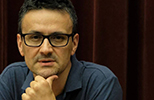
The work Sou já do que fui (2019) for four hand piano by Paulo Bastos, will be performed in the context of the concert by the Kla-Vier Duo constituted by the pianists Patrícia Ventura and Sónia Amaral. It will take place on February 26 at the Casa de Portugal – André de Gouveia/ Cité Internationale Universitaire em Paris ( Saison Croisée France-Portugal). The recital's programme will also include various other pieces by Arvo Pärt, Claude Debussy, Fazil Say, Tomás Alvarenga and António Victorino d'Almeida. “ Sou já do que fui emerges in the context of the Transmusica project. The piece deals with the unifying theme of identity from an individual perspective – the identity of the ‘I’. Sou já do que fui (I am what I’ve already been) is an autobiographical work, approaching in a conscious way the sonorities and general features of my music during the last years. The title originates from the following eclogue by Luís de Camões: ‘I am what I have already been, so different, that when somebody calls my name I am amazed to realise that I am still like myself’” – says Paulo Bastos (composer published by the MIC.PT) in the work's programme note.
|
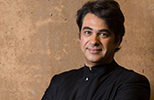
The work Deux Portraits Imaginaires (2013) by Pedro Amaral (composer published by the MIC.PT) will open the concert taking place on February 10 at the Gulbenkian Foundation in Lisbon, and performed by the Gulbenkian Orchestra with Ricardo Castro (conductor). The concert's programme also includes Chopin's Piano Concerto no. 2, performed by the pianist Maria João Pires and Debussy's La Mer. “ Deux Portraits Imaginaires is a ‘programmatic’ piece based on a dialogue between two characters. Here the purely instrumental music aims at drawing a portrait of each character, their deep personality and psychological state in the moment of their dialogue. The characters are doubly imagined. The first one is Faust, based on his reading by Fernando Pessoa in his unfinished work Fausto, Tragédia Subjetiva; the second one is Maria – not Goethe's Gretchen –, representing the feminine figure, the impossible love” – reveals Pedro Amaral in the note on his work Deux Portraits Imaginaires. This month the Gulbenkian Orchestra will also perform this programme at the Philharmonie de Paris (February 12), Auditori de Girona (February 13), and at the Palau de la Música Catalana in Barcelona (February 15).
|
 The new article by the horn player and composer published by the MIC.PT, Ricardo Matosinhos, entitled A New Voice for the Wagner Tuba, will be published in the February edition of the The Horn Call journal, released by the IHS – International Horn Society. Simultaneously, this text (both in English and in Portuguese) will be also available for the International-Horn-Society members, on the Society's website. The mentioned article results from a research carried out by Ricardo Matosinhos concerning the repertoire for Wagner tuba which exists outside the orchestral, operatic, and cinematographic contexts. In this sense the composer has encountered 100 works for solo Wagner tuba, with the accompaniment of keyboard instruments, with orchestra, as well as with different chamber-music ensembles. This article provides a new point of view on the Wagner tuba by means of a little-known repertoire. Ricardo Matosinhos explains that his objective has been to encourage horn players to use more the Wagner tuba in their performances, and that this text can likewise constitute an encouragement for contemporary composers to write new works for this ‘Valhalla-gods instrument’.
|
 The new video recording of the multimedia opera Salt Itinerary (2003-6) by the Miso Ensemble – with performance, composition, texts and concept by Miguel Azguime (composer published by the MIC.PT), and staging, video creation, sonic projection and live electronics by Paula Azguime –, is now available on Miguel Azguime's YouTube Channel. This new recording was realised at the O'culto da Ajuda in Lisbon in December 2021 – 15 years after the release of the Salt Itinerary DVD by the Miso Records. The recording has followed the selection of this opera as the winning performance ( Le Meraviglie del Possible) at the LMDP – Festival Internazionale di Teatro Arte e Nuove Tecnologie (Kyber Teatro, Cagliari, Italy). Salt Itinerary is a reflection on creation and insanity, revolving around the language – the concepts of ‘words as meaning’ and ‘words as sounds’, treated as dimensions of the voice constituting the body's extension. This concept is integrated in the stage construction as a tangible sonic and visual projection of the word's resonance.
|
Accordion Composition Prize 2022 · Folefest Two composers published by the MIC.PT – João Pedro Oliveira and Miguel Azguime –, make part of the Jury of the Accordion Composition Prize 2022, presided by the composer and accordionist Paulo Jorge Ferreira. This initiative by the Folefest Association, organised in partnership with the Antena 2 and the MPMP Património Musica Vivo, aims at promoting and encouraging classical contemporary-music creation for accordion, thus contributing for the quantity-and-quality development of this repertoire. The Prize is destined to Portuguese composers, or foreigners residing in Portugal, of any age. The competition works, written for solo accordion and lasting between 8 and 12 minutes, must be inedited, and the Competition's organisers reserve the right to carry out the premiere performance of the awarded compositions. The submissions, sent via registered mail, are accepted until June 24, 2022 (send date).
|
| |
RIZOMA · Presentation

logo · riZoma
riZoma · Portuguese Platform for Intervention and Research in New Music is a network formed by a wide range of active Portuguese entities, connected with the creation, education, performance and research, with broad experience in the context of contemporary classical music. The riZoma Platform was created to establish the dialogue and articulation between these entities and to allow them to speak in one voice with the audiences and trusteeship, emphasising the effort perpetrated by many and creating a new force settled on the priceless value which the contemporary classical music cerated in Portugal has for the country's cultural identity.
|
RIZOMA · Calendar

logo · riZoma
The riZoma online Calendar constitutes an indispensable source of diffusion and information on the Portuguese-classical-contemporary-music sector, joining and revealing all the activities organised and promoted by each of the riZoma entities and thus evidencing the sector's richness.
|
Invention & Research Music

imagem ilustrativa · 4/ 02 · 1h00 · Antena 2 ·
In the 1st Person, Ângela Lopes
A programme within the In the 1st Person cycle with an interview to the composer Ângela Lopes. The Research and Invention Music radio broadcast continues this cycle of conversations with Portuguese contemporary composers, to get to know better their creative universes, ideas on music and ways of composing. During this programme, apart from listening to some of Ângela Lopes' works, the composer will talk about her more recent projects. Born in 1972, Ângela Lopes studied Composition at the ESMAE, having continued her studies at the University of Aveiro. She has composed various works for orchestra, chamber music and solo-instrument pieces, with and without electronics, as well as the opera A Floresta em Dodona. She's also director of the Santa Maria da Feira Music Academy.
|

imagem ilustrativa · 18/ 02 · 1h00 · Antena 2 ·
In the 1st Person, José Carlos Sousa
Another interview within the In the 1st Person cycle, with the composer José Carlos Sousa, to get to know better his creative universe and his work. Born in Viseu in 1972, José Carlos Sousa studied at the Conservatory in Viseu, having then enrolled at the Composition course at the University of Aveiro. Since 2008 he's Artistic Director of the International Spring Music Festival in Viseu. His music has been performed at various national and international music festivals in Europe and America. During this programme Pedro Boléo talks with the composer about his path in composition and his more recent work, including various chamber-music pieces with electronics.
|
New Scores on the MIC.PT

illustrative image The score edition by the MIC.PT aims at distributing scores of works by Portuguese composers, making them available online and thus promoting the choice of Portuguese music among musicians & researchers.
|
João Quinteiro (JQui0007)
dois rios (2019) · violoncello and prepared piano
|
Recent Premieres
|
15 / 01, Sons de Bolso, Boarder Landmark n.º 1, Cevide
Andrea Conangla (singing voice and whisper I); Teresa Silva, Tiago Batista, Nuno Areia, José Silva, José Tiago Batista (whispers II); Luís Neto (recording & master); Manuel Brásio (percussion & electronics) |
Danças Portuguesas>> see work
15 & 16 / 01, Teatro Municipal da Covilhã & Cine-Teatro Marques Duque, Mértola
Orquestra Sem Fronteiras; Martim Sousa Tavares (conductor)
|
Das Murmeln Der Zeit>> see work
23 / 01, Konzertsaal im Kulturpalast, Dresden, Germany
Bruno Borralhinho (conductor); Mediterrain Ensemble
|
Fake Nature Makes Me Cry>> see work
27, 28 e 29 / 01, Culture Centre in Chaves, Calouste Gulbenkian Conservatory in Braga, FEUP Auditorium in Porto
Drumming – Percussion Group; Marimba Quartet: André Dias, Miquel Bernat, João Miguel Simões & Pedro Góis
|
Sísifo, cinco da tarde>> see work
29 & 30 / 01, O'culto da Ajuda, Lisbon
Fernando Brites (accordion), Júlio Mesquita (speaker), João Quinteiro (live spatialisation) |
|
Music by Portuguese Composers at the Lisboa Incomum To inaugurate a new Immersive Sound System, the Lisboa Incomum venue and the DME Festival present the Immersive Festival, which will take place on February 19 and 20. The event will open with a concert with acousmatic works by the two composers published by the MIC.PT: Hugo Vasco Reis and Jaime Reis; as well as by Marta Domingues. On February 20 the Festival will host a video-music concert curated by João Pedro Oliveira (composer published by the MIC.PT); and the sound installation Lugares Invisíveis by Carlos Caires (composer published by the MIC.PT), will be open for the public during the whole weekend. In the end of the month, on February 26, the DME Festival and the Lisboa Incomum will organise a concert dedicated to the music of José Luís Ferreira (composer published by the MIC.PT), paying tribute to this artist who passed away prematurely four years ago.
|
Music History Course · Music in the Portuguese Cinema During this month – February 7, 14 and 21 – the Casa da Música in Porto organises the 13th Music History Course (Saber Ouvir) · Music in the Portuguese Cinema (1st Module), conducted by Manuel Deniz Silva, musicologist and researcher particularly interested in this subject. In the 20th and 21st centuries a significant number of Portuguese classical-music creators have worked within the Portuguese film industry, including various composers published by the MIC.PT: António de Sousa Dias, António Pinho Vargas, Constança Capdeville, and Jorge Peixinho; and also: Álvaro Salazar, António Victorino d'Almeida, Armando Leça, Joly Braga Santos, Frederico de Freitas, Luís de Freitas Branco, Ruy Coelho, and Tomás de Lima. These have been some of the main Portuguese composers regularly or sporadically participating in film projects. The aim of this course is to analise these music collaboration, tracing, through the prism of cinema, an alternative history of music composition in Portugal.
|
Vórtice · performance with music by Catarina Ribeiro, Daniel Moreira and Miguel Resende Bastos Vórtice (para o fim de um Tempo) is a performance revolving around music composition and installation, transforming the conventional concert into a more plastic, immersive and dynamic format. The piece has been created collectively from the cooperation between a playwright (João Lourenço), three composers – Daniel Moreira, Miguel Resende Bastos (composers published by the MIC.PT) and Catarina Ribeiro –, a light designer (Pedro Nabais), sound designer (José Afonso) and four musicians from the Caleidoscópio Quartet (clarinet, piano/ keyboards, violin and cello). Vórtice invites the public for a journey where it is possible to interact with three visions about the end of the Time, intersected with sound and light installations, providing an aesthetic experience which poses a challenge to abandon the clock's temporal ironworks in search for the centre of the vortex, and in the meditative search of the Time itself. The performance will take place on February 22 at the Casa da Música in Porto.
|
1st Performance Competition
Pieces by five composers published by the MIC.PT – Ângela da Ponte, Nuno Peixoto de Pinho, Paulo Bastos, Ricardo Matosinhos and Sofia Sousa Rocha –, are included in the repertoire of the 1st Performance Competition organised by the Arpejo Publishing House, as part of the project 5 Graus 5 Peças ( 5 Levels 5 Pieces) supported by the Garantir Cultura – GEPAC programme. The aim of this initiative is to encourage the participation of the Music Education pupils in the dissemination of the works by Portuguese contemporary composers, taking Portuguese music specially designed for instrumental teaching to a main front of the education panorama. The competition's repertoire also includes pieces by: Ana Seara, Eduarda Ferreira, Gonçalo Lourenço and Gerson Batista. The competition's candidates are to submit on YouTube, until April 12, the video/ execution of one of the obligatory pieces.
|
|
_mailchimp_en.jpg) |
|

_mailchimp_en.jpg)















